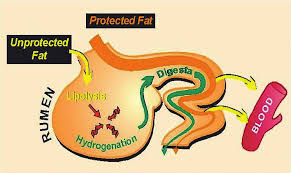Technology for Preparation and Feeding of Bypass Fat (Rumen Protected Fat) to Dairy Animals
What is bypass fat?
- Dietray fat, which is not degraded in upper portion
of digestive tract (rumen) of animal, but gets digested in lower alimentary tract is known as bypass fat.
What are synonyms of bypass fat?
- Rumen protected fat.
- Calcium salts of long chain fatty acids.
- Calcium soaps.
Why to supplement bypass fat to dairy animals?
- Immediate after calving, there is huge loss of
energy from dairy animals through milk, but feed intake is reduced.
Therefore, animals remain in negative energy balances.
- Due to above facts, milk production, reproductive performances and body condition of animals are adversely affected.
- Adverse effect is more in high producing animals.
- Bypass fat is rich source of energy.
- Besides, bypass fat is a good source of calcium.
- Thus, supplementation of bypass fat improves
milk production, reproductive performances and body condition of animals.
Why oil can not be included instead of bypass fat to get more energy?
- Inclusion of oil causes digestive problems in
animals. - As oil is degraded in upper part of digestive tract (rumen) of animals, avialbility of energy is lower than bypass fat.
What are advanatges of supplementaion of bypass fat to dairy animals?
- Keeps animals in positive energy balance.
- Increases milk yield (up to 20%).
- Increases milk fat content.
- Bypass fat containing
- Effect tends to be greater in high yielding
dairy animals (cows producing more than 15-
- Maximises peak milk yield and lactation days.
- Improvement in reproductive performances.
- Prevents post-partum weight loss.
- Improves general body condition.
- Protects from heat stress.Effects is not similar in all types of dairy
- Is effect of supplementation of bypass fat similar in all types of dairy animals?
- animals. liters milk/ day and buffaloes producing more than 8 liters milk/ day).
-
- Effect tends to be greater in early lactation
(0-90 days) than mid lactation (91-150 days). - Effects tends to be more in Holstein cows
Where bypass fat is available?
- Effect tends to be greater in high yielding
- Bypass fat containing
-
- different level of fat are avilable in market commercially.
- What is the appearance and composition of bypass fat
- It looks like white or creamy granular powder.
- 70-75% vegetable (palm) fat (approx.).
- 7-8% calcium (approx.).
How much bypass fat to be supplemented?
- 15-20 g/ kg milk production/ animal/ day.
- It can be supplemented to dairy animals
- What is the economics of supplementation of bypass fat to dairy animals?
. Cost of production of the indigenously prepared
bypass fat is highly dependant up on the cost
of raw materials.- In present situation, cost of production of
bypass fat is 80/- per kg. - Approximately, feeding 300g bypass fat/
animal/day incresaes milk production by
1.0-1.5 ltr/day, giving a net profit of 8-24/ animal/day.
- However, on purchase of raw materials in bulk,
cost of production of the indigenously prepared bypass fat can be reduced significantly and profit will be more.
- In present situation, cost of production of
source-
For further reading
Naik, P. K., Saijpaul, 5. and Rani Neelam (2007)… Animal
Nutrition and Feed Technology, 7: 95-101.
Naik, P. K., 5ai jpaul, 5. and Rani Neelam (2007)… Indian
Journal of Animal Nutrition, 24: 212-15.
Naik, P. K., 5ai jpaul, 5. and Rani, Neelam (2009)… Animal
Feed Science and Technology, 153: 68-76.
Naik, P. K., 5ai jpaul, S., Sirohi, A. 5. and Raquib, M.
(2009)… Indian Journal of Animal Sciences, 79:
1045-1049.
Naik, P. K., Sai jpaul, 5. and Kaur, K. (2010)…Indian
Journal of Animal Sciences, 80: 902-905.
Prepared By
Dr. P. K. Naik Dr. N. P. Singh
Senior Scientist (Animal Nutrition) Director
Published By
Dr. N. P. Singh
Director
ICAR Research Complex for Goa
Old Goa – 403 402, Goa
For Details, Please Contact
Dr. N. P. Singh
Director
ICAR Research Complex for Goa
Old Goa – 403 402. Goa; Telephone: 0832-2284678/79
E-mail: director@icargoa.res.in: Website: www.icargoa.res.in
© All rights Reserved 2011, ICAR Research Complex for Goa
Technical Assistance Secretarial Assistance
Mr. Edward Crasta Mr. S. Marathe
T-5 (Animal Sciences) T-5 (PME Cell)


